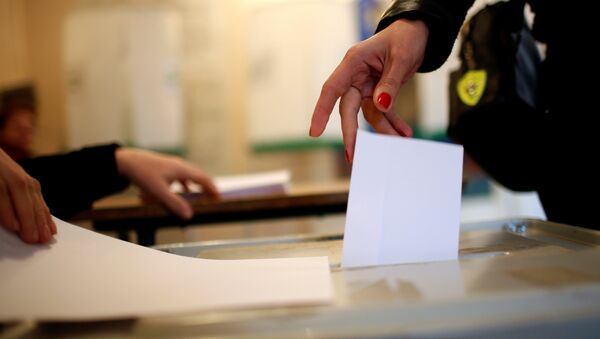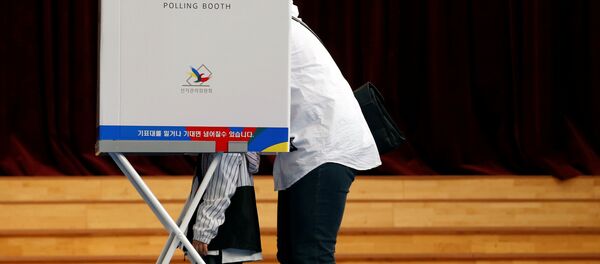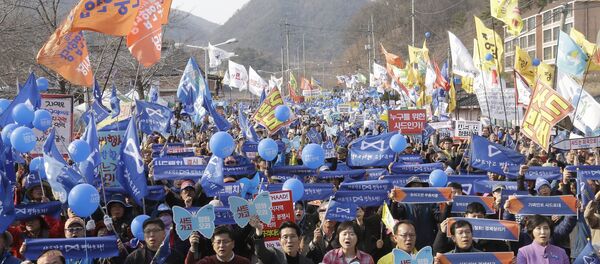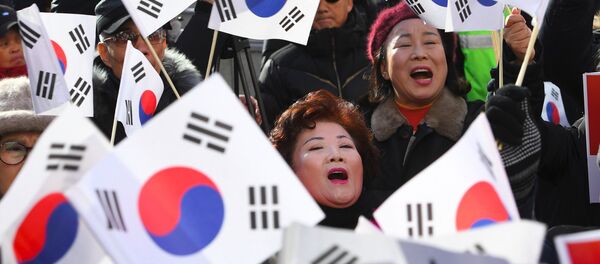MOSCOW (Sputnik) — A total of 13 hopefuls will take part in this year's presidential race after two nominees dropped out. The two main rivals are Moon Jae-in of the liberal Democratic Party of Korea and Ahn Cheol-soo of the center-left People's Party, according to various polls.
Under the national Constitution, the president of South Korea is elected by universal, equal, direct suffrage and by secret ballot.
The president serves only five years in office and cannot be reelected for another term.
Presidential elections are held 40-70 days before the incumbent president’s tenure expires. In case of early elections, a new president must be elected over a period of 60 days.
Any South Korean citizen aged 40 and over who has lived in the country for at least five years can run for president. Anyone who has lived abroad as a civil servant for over five years or lived abroad while retaining South Korean residence will therefore enjoy uninterrupted South Korean residency.
Individuals with suspended voting rights shall also be deprived of passive voting rights. But the convictions of individuals serving prison sentences must also be overturned.
Presidential candidates can either be nominated by political parties or can have independent status. Any independent presidential candidate needs to collect 2,500-5,000 signatures from voters that are divided among five or more prefectures.
A candidate needs to submit a written registration request to the appropriate election commission 24 days before the presidential election.
If a candidate for any elective position is nominated by a political party, then his or her registration request must be followed by a letter of recommendation signed and stamped by an official representative of a given political party. Independent candidates also need to submit a registration request with voter signatures.
Each candidate needs to submit an election bond worth 500 million won ($440,000).
In certain cases, the appropriate election commission will repay the bond no later than 30 days after the election. The bond is repaid completely if a presidential candidate has been elected or has died after receiving over 15 percent of eligible votes. And 50 percent of the bond is repaid if the appropriate candidate has received 10-15 percent of votes during the election. The entire bond is also repaid in full if a candidate dies before the election or if his registration has been ruled invalid.
The Law on Elections envisions special immunity guarantees to candidates running for elective positions. No presidential candidate can be arrested or detained, unless caught in the act of committing a capital offense or a crime punishable by a prison term of seven years and more.
The National Election Commission heads the system of election bodies consisting of almost 4,000 subordinate election commissions.
The National Election Commission heads the system of election bodies. Election commissions in prefectures and special-status/metropolitan cities, equal to prefectures, are the next level. And municipal election commissions make up the third and fourth levels. The President of South Korea is elected in a joint nationwide district.
Polling stations are open from 6 a.m. until 6 p.m. local time and, if necessary, can remain open until 8 p.m. local time.
Minors who are no younger than primary-school students can accompany any voter to the polling station. Voters with disabilities and visually impaired people can come to the polling station with family members or two escorts chosen beforehand. If a voter accidentally ruins a ballot, it is impossible to receive another one.
A candidate receiving a majority of votes shall be elected president. Single-candidate election calls for obtaining over one-third of all eligible votes.
If the two leading candidates have received the majority of votes and if it is impossible to determine the winner after the election, then the National Assembly shall elect the President. In this case, a candidate receiving the majority of votes at an open National Assembly session involving most members of parliament shall be deemed elected.






